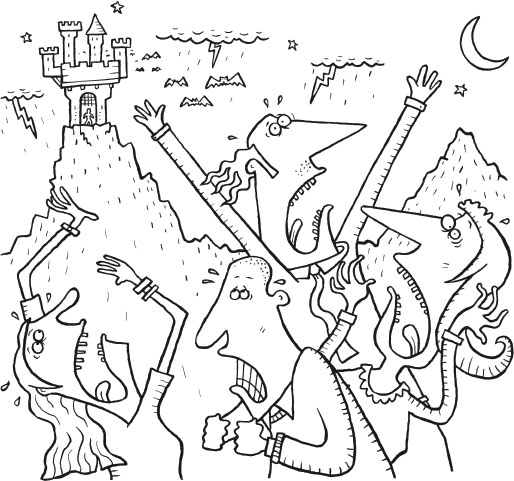

So far I hope I’ve sold this LGBT* thing pretty well. I mean, it does sound brilliant, doesn’t it? You get to dress how you like and make out with whomever you want. It’s dead hip and trendy (just ask Zachary Quinto, Andrej Pejic or Angel Haze). You get to be part of an avant-garde subculture with links to art, music and fashion. But, most importantly, you will be at one with who you really are. You are finally you.
Ah, if only it were that simple. While some people glide effortlessly out of the closet like prized figure skaters, others find the process more akin to Bambi learning to walk. For some, coming to terms with their sexuality and coming out is the hardest thing they will ever do.
But why is it so hard for some people?
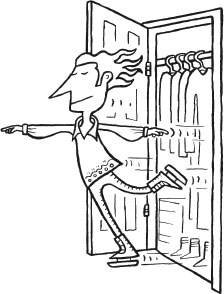
Homophobia is described in the Merriam-Webster dictionary as the ‘irrational fear of, aversion to, or discrimination against homosexuality or homosexuals.’ Note the ‘irrational’ part. The definition is also true of transphobia.
Homophobia, broadly speaking, comes from two places – inside and out: other people airing anti-gay sentiments, but also individuals themselves believing that there’s something wrong with being gay or bi. Again, the same is true of transphobia. Many trans people will have grown up in environments where they have been led to believe there is something ‘weird’ about swapping gender.
What if you believe there’s something wrong with being gay, bi or trans and you happen to BE gay, bi or trans. This is more common than you might think. For ease, let’s call this SELF-LOATHING.
If a young person thinks there is something wrong with being LGBT*, they’re hardly likely to sing their identity from a balcony, Evita style, while waving a rainbow flag, are they?
Clearly, the issue here is why do they think being LGBT* is wrong? I can’t imagine anyone is born homophobic (or transphobic), so it must come from external sources, which brings us neatly to homophobia.
Sadly, there are small-minded bigots everywhere, and they don’t half enjoy letting you know how idiotic they are. ‘It’s a free country,’ they say. ‘I can say what I like.’ Well, actually, inciting hatred is a criminal offence so, no, you can’t.
See? Irrational. Also stubborn, ill-informed and ignorant.
Transphobic people will be similarly disgusted with trans people, whether they think it’s just an impossibility for one to change their gender or if, as with gay people, they see trans people as EVIL SEX SIRENS WHO WILL FOOL YOU WITH THEIR GENDER SECRET. Talk to a certain type of cisgender person about Thailand and within seconds they’ll say something disparaging about the third gender, I promise you. Jerry Springer was terrible for this too.
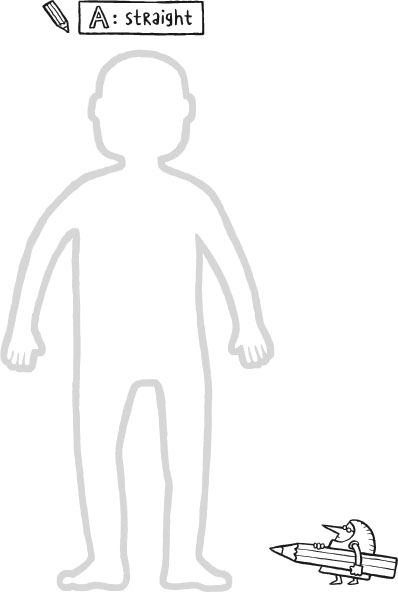
If a young person has grown up with parents or carers who have tutted every time a gay couple pops up in a soap opera, they have sent a unanimous message to their child that they do not approve of LGBT* people. It doesn’t even have to be parents or carers. If a peer group at school has spent ten years saying, ‘HA! THAT PENCIL CASE IS WELL GAY!’ the same message is being spread: that pencil case is rubbish, and so are you.
The language we use is incredibly powerful and oh-so-easy to internalise. I’d like you to do a little activity. You will need a pen or a pencil. On these pages are two (genderless) people. Keeping inside the lines (we’re not animals), write all the words (both kind and unkind) you know that describe straight people in Person A and LGBT* people in Person B.
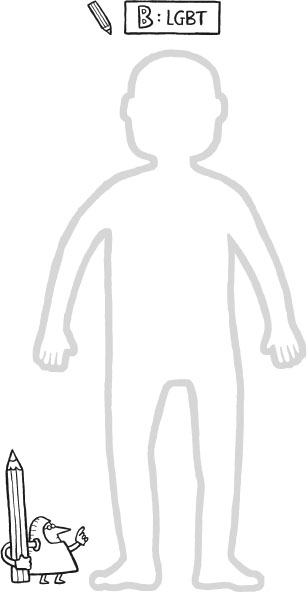
All done? I’m willing to bet that there’s a lot more writing on Person B. Perhaps you’ve written ‘straight’, ‘cis’ or ‘normal’ on the Person A.
With the possible exception of ‘breeder’, there aren’t an awful lot of derogatory terms about straight people, because our society is run predominantly by them.
However, Person B, I’d imagine, is covered from head to toe in abusive, offensive, ill-informed and damaging slurs. Am I right? Pretty much any words other than ‘gay’, ‘lesbian’, ‘bi’, ‘transgender’, ‘queer’ or ‘curious’ are inappropriate. This is why I personally won’t list them in this book – I don’t want to add to that toxicity. The words change, but there will always be brutal words to cut minority groups down to size. We call this an ‘obliteration exercise’. Poor Person B is quite literally obliterated by insults.
There is no person left at all.
This is what homophobia does to young people. However thick our skin is, I imagine even the toughest young LGBT* person has thought, ‘Oh, God, this isn’t going to be easy.’ And it isn’t. Ever. Although we may be pleased we’ve figured ourselves out AND we may have the most supportive parents or carers in the universe, we all KNOW we’re coming out into a world that is littered with hatefulness.
BUT it’s this adversity that makes LGBT* people strong. It’s why we call ourselves proud. If you can recognise how much hate there is in the world and still come out as LGBT*, you, my friend, are a fighter.
LGBT* people are STRONG. Because we have to be.
This is a far more insidious type of homophobia. In fact, some people would say this isn’t homophobia at all, but I think it’s just as damaging.
I’d like you to pick up any magazine that isn’t Attitude, Diva or GT. Have you done that? Good. Have a flick through and stick a Post-it note on any advertisements unambiguously featuring gay couples (i.e. not just two women laughing at salads).
Hint: You won’t need ANY Post-it notes because there aren’t going to be ANY.
We could have carried out similar tests at the cinema, on TV, in literature or at the theatre. With the possible exception of androgynous models like Andrej Pejic, Athena Wilson and Casey Legler, you’re not going to see proper representation of trans people either.
Despite an AWFUL LOT of people in the world being LGBT*, we are practically invisible in the media, something I find BAFFLING given that white gay men are hugely OVER represented in media production.
Heteronormative values are forced down our throats from birth. Cinderella gets together with a dude she met once and lied to; the Little Mermaid rejects her entire culture for a bloke; that Princess trick even goes for a spot of bestiality and makes out with a FROG – but there are NO LGBT* role models for kids.
It doesn’t get much better in TV, books and films. With a few notable exceptions (And Tango Makes Three, The Family Book), preschool and tween content is almost exclusively straight. What’s more surprising is that content aimed at teens isn’t entirely balanced. Some teen soap operas bravely include LGBT* characters (let’s name UK soap Hollyoaks as an outstanding provider of LGBT* characters), and some authors (ahem) do feature LGBT* characters in their novels. However, the number of gay characters probably doesn’t match the proportion of LGBT* teens in the real world, and too often LGBT* characters are suicidal runaways – hardly representative.
Outside of the media, let’s talk about schools. In history, did you learn about Alan Turing? Harvey Milk? What about Billie Jean King?
What does this all mean? Why is this homophobia? Because every time you access a media outlet (including the Internet – I get straight singles ads on Facebook) or walk into school, you are being told
So just because something isn’t being openly hostile towards LGBT* people doesn’t mean it’s not quietly whispering that you’re weird. Well, of course, you’re FINE. It’s the system that’s total slug poop.
BEARD (noun)
A pretty woman attached to the arm of a closeted gay man to convince the rest of the world he is a straight, manly man, hence ‘beard’.
Often to be found attached to the arms of closeted gay Hollywood actors such as NAMES REDACTED.
LAVENDER MARRIAGE (noun)
A fake marriage designed to make husband, wife or both appear heterosexual in the public eye. Popular in Hollywood with the likes of NAMES REDACTED, in seemingly happy marriages.
Both of these institutions deprive young LGBT* people of high-profile role models within Hollywood.
Some would argue that both homophobia and transphobia have roots in suspicion and paranoia. The less we understand a group in society – the less we bother to learn – the more misconceptions and worries we have. For a long time, LGBT* people were relatively secretive, thus adding to the suspicion.
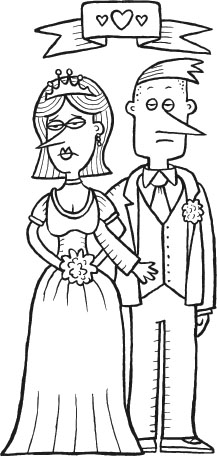
There was another major turning point, historically, that contributed to fear and paranoia, particularly about gay men, and that was the AIDS epidemic in the 1980s.
Let’s have a history lesson:
The precise origin of HIV (human immunodeficiency virus) and AIDS (acquired immune deficiency syndrome) isn’t known, although we can probably assume that the HIV infection, which attacks the immune system, jumped from apes to humans in Africa in the early twentieth century. Somehow, an unknown carrier of the virus travelled to the United States in the late 1970s, and the epidemic – and later pandemic – took hold.
For a time, HIV/AIDS was called GRID (gay-related immune deficiency), and by the time the medical world cottoned on to the fact that the illness could affect anyone – gay or not – the damage was already done. HIV/AIDS had become a ‘gay disease’.
The reputation rose out of large gay communities in New York and California, where gay and bi men, who previously had no pressing need to use condoms, spread the infection at an alarming rate. Thousands of men died before clinicians could properly understand the disease.
Carriers of HIV were infected for years before becoming ill, and they infected others before they even realised they were carrying the virus. As they travelled the world, AIDS became a truly global problem, affecting EVERYONE, but the reputation of its being a ‘gay thing’ stuck.
Ask ANY gay person who grew up in the 1980s, and they will tell you about a terrifying TV advert that featured people being squashed by a giant AIDS gravestone. It caused national panic. The problem was that people didn’t properly understand the disease. Some people thought that you could be infected by sharing mugs or toilet seats with carriers of the virus. You can’t, obviously – the virus is transmitted mostly through blood and semen – but ignoramuses became very wary of gay people. This wasn’t just about, ‘they might try to trick me into bum sex,’ any more, it was more, ‘this person could kill me’.
It has taken thirty years to better educate people about HIV/ AIDS, and there are now effective treatments but the stigma remains. Many out and proud gay men (and in this case, it IS mostly gay or bi men, not lesbians) will happily come out as gay but not as HIV positive for fear of judgement.
So for many awful, small-minded people, fear of gay people and fear of HIV/AIDS are permanently linked. Even if you’re a child of the nineties, your parents will vividly remember the AIDS crisis. It’s knowing their parents may still worry about HIV/ AIDS that keeps a lot of young gay men, in particular, trapped at the back of the closet with a mouldy cagoule and some mothballs.
Bullying is systematic abuse – verbal, physical or mental. Homophobia (as discussed) is the irrational fear of LGB* people. Put them together, and you have people being bullied for their sexuality. Transphobic bullying is aimed at people perceived to be transgender.
If we’re being picky, someone screaming, ‘Oi, woofter!’ at you in a street isn’t homophobic bullying, it’s homophobic abuse. There’s a key difference – bullying suggests a repeated campaign against an individual or group.
Let’s start with physical abuse or bullying. Well, assault is always a crime, so the law is on your side. What’s more, the Criminal Justice Act (2003) means that homophobic/transphobic crimes are dealt with more seriously and perpetrators given longer jail sentences. Some police forces also have an LGBT* liaison officer to help victims of crime. If you have been assaulted, you should call 999 or visit your local police station. If an assault happens in a school, it is still assault and you should call the police or get someone at your school to do so.
Third-party reporting – where you can get someone you know to report a crime – means you don’t even have to identify yourself if you would rather keep your sexuality a secret.
‘When I was in Year 9, I came out and told my friends and they were OK with it, and then I told my dad. I asked if there was any support at school because I was being bullied. People used to pick on me, and one time a load of guys in a corridor stood up against the wall and said, “Cover your arses.” I told the teachers I was getting bullied and I went to the student counsellor. After I spoke to her, she did a presentation about homophobic bullying. She got me to speak to everyone about it, which was really difficult. After the assembly … most of the bullies stopped; only a few carried on. People still come up to me and say how I was so brave.’
N, 17, Burgess Hill.
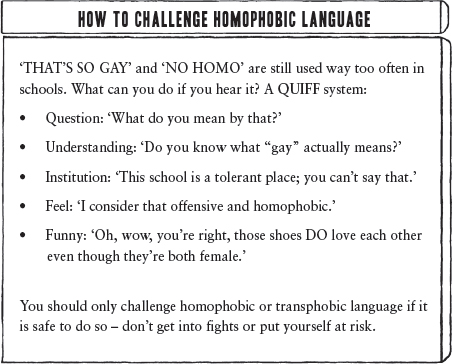
Homophobic and transphobic bullying is still a huge problem in schools. Why? If you asked most young people, ‘Do you hate gay people?’ they’d probably say no. I think it’s because ALL bullying is a problem in schools, and in such close quarters people will lash out in any way they can – so whether it’s your hair, your weight, your glasses, your braces, your clothes OR your perceived sexuality, people will always find something to take the piss out of.
THAT DOESN’T MAKE IT OK.
You can, of course, do your bit by not taking the piss out of other people. I don’t think anyone is blameless when it comes to high school bullying. I think, on any given day, an individual can be both a bully and a victim.
Note how I said PERCEIVED sexuality. Remember, it’s not just LGB* people who experience homophobic bullying – plenty of straight people have homophobic slurs made against them too.
The impact of homophobic bullying is huge. Gay rights charity Stonewall conducted research and found that fifty per cent of young LGB* students had truanted, while seventy per cent said it had affected their attainment at school. Well, that’s just not good enough.
Homophobic and transphobic bullying can take many forms:
The law is on your side again. BY LAW a school has to tackle all forms of bullying AND provide a safe space. Schools must also take POSITIVE steps to make young LGBT* people feel included – it’s not enough for schools to merely tolerate us.
Be a SQUEAKY GATE: If you politely make enough noise at school, someone will eventually oil the hinges.
In 2008, I moved back to Scotland after having lived abroad – a sixteen-year-old with my mind set on going to university in two years’ time.
‘Aye, see that new boy from Canada? F**kin’ poof.’
What Kyle had said to Graeme in the corridor, oblivious to my presence, stuck with me. How did he know? I thought. Where has all this come from? I barely know him!
Having spoken to me once previously, he had made all of the assumptions he needed to start a two-year campaign of fear and isolation in my final years at high school. I could put it down to his immaturity – he was a year younger than me – but that only washes so many times. There were outright verbal attacks and a few physical attacks in PE by Kyle and Graeme. Trying to explain why you’ve got massive bruises down your side from being hit repeatedly with hockey sticks isn’t easy to do. Somehow, I managed to explain it away.
I must admit, I look back at what happened and scream at my naivety for not having said anything sooner. In my last class on a Friday, I was discussing with a friend whom I had told I was gay what our plans for the weekend were. The plans involved seeing my then boyfriend on Saturday for one thing or another.
‘It’s so nice’, said Gemma, ‘that you’ve managed to find yourself a boyfriend.’
To my shock and total terror a girl who sat behind me exclaimed, ‘You’re gay?! I would never have guessed!’
This would have been bearable, but there were two problems: first being that my entire French class now knew, and the second that Kyle sat directly behind her. The last fifteen minutes of the class dragged on, and I can’t remember much apart from my overwhelming sense of guilt, shame and excruciating lack of hubris; people were demonising and defending me all at once. Kyle finally had his confirmation: Douglas is gay.
I remember leaving early to collect my instruments from the music department and scurrying to my locker.
By the time the rest of my year were down at the lockers, everyone knew. Some people were supportive, but Kyle, Graeme and their friends took great delight in tormenting me as I gathered my things together.
I didn’t want to return to school on Monday. I was deliberately late so as not to have to deal with anyone in registration. By this point, my guidance teacher had a log of any incidents I had reported to her.
A few weeks later, I was standing at my local train station waiting for a taxi to take me home. (I didn’t and still do not feel safe walking home at night on my own.) Kyle and Graeme walked past me and started shouting abuse at me in the street. I had learned to deal with it in school but not in the street. They left and I got in a taxi. When I was finally in my house and safe, I cried. Why me? How could they find this acceptable? As far as I could make out, it was my bedroom practices they were ridiculing, but somehow they’d cut to the very core of my identity.
How to tackle homophobic/transphobic bullying at school
These steps would work well for any kind of bullying:
My advice is NEVER TAKE IT. As hard as it is, FIGHT.
As a final word on bullying, be aware that the day you leave school, your life as a young LGBT* person will improve, but only because everyone’s life improves when they leave school.
It’s become the slogan of the anti-homophobic-bullying movement, but IT GETS BETTER.
‘About a year in [to my MTF transition], six months after I started presenting as myself full-time, my employer, which had seemed understanding at first, took steps towards showing me the door. I wound up saving them the legal hassle and just quitting, because it was getting unbearable. There is essentially no protection, and you are definitely going to change jobs at some point, either because they fire you or because they make things very unpleasant until you leave voluntarily. As an example of unpleasantness, it’s also fairly common (as happened to me) that they’ll ask you to limit your bathroom usage to a single-occupancy facility if they have one; in my case, the only one available was an elevator ride away and badly ventilated, so it smelled horrible, unlike the normal facilities in that building. I also know several trans women who are required by their employers to use the men’s room.’
Irene, 33, New Jersey, USA
But what if life doesn’t improve once you head into the working world? As discussed, there are small-minded people everywhere, I’m afraid – in your office, your hospital, your police station, anywhere you can imagine. But more good news! Once again the law is on your side: being LGBT* is a ‘protected characteristic’ (which I like because it makes us sound like a beautiful rare butterfly on the verge of extinction in Java or something). It means, legally, that you cannot be discriminated against when applying for a job, in education, when buying or renting property, or when accessing public services (e.g. doctors or dentists).
Once you have a job, you cannot be dismissed because you’re LGBT*; get less pay than a straight, cisgender colleague; be held back for promotion; or be made redundant (because you’re LGBT*). If you’re just plain crap at your job, then you’re on your own, obviously.
If you think you have been discriminated against in the workplace, you can speak to your human resources department (if you have one) or get mediation from an outside agency such as ACAS (see the ‘Helpful websites and numbers and stuff’ section for contact details). You can also go to your local Citizens Advice Bureau. These sorts of disputes are often settled in court.
Earlier, I said that it wasn’t all Kylie and canapés, and I wasn’t kidding. Homophobia kills. The following statistics are REAL and are why we all have to stand up against hate.
Except where stated, all statistics courtesy of ‘Stonewall – School Report 2012’, ‘Gay and Bisexual Men’s Mental Health Survey 2011’, ‘Homophobic Hate Crime: The Gay British Crime Survey 2013’.
That was a maudlin bomb detonating in your face. Yeah, I know this all makes for hugely depressing reading, but I’m all about the TRUTH. Clearly, being LGBT* does not automatically make you depressed or suicidal, but the fact is that young LGBT* people, when exposed to hatred or homophobia or when living with anxiety and threat, are bound to be vulnerable to mental health problems.
This is why all of us – all LGBT* people, young and old – are still working for greater acceptance and challenging homophobia. Even a book like this would have been unthinkable ten years ago. It’s CRAY! A book about YOU in a school library! Whatever next?!
Hopefully, as tolerance, understanding and visibility of LGBT* people increases, homophobia will die out with the ignorant people it lingers in.